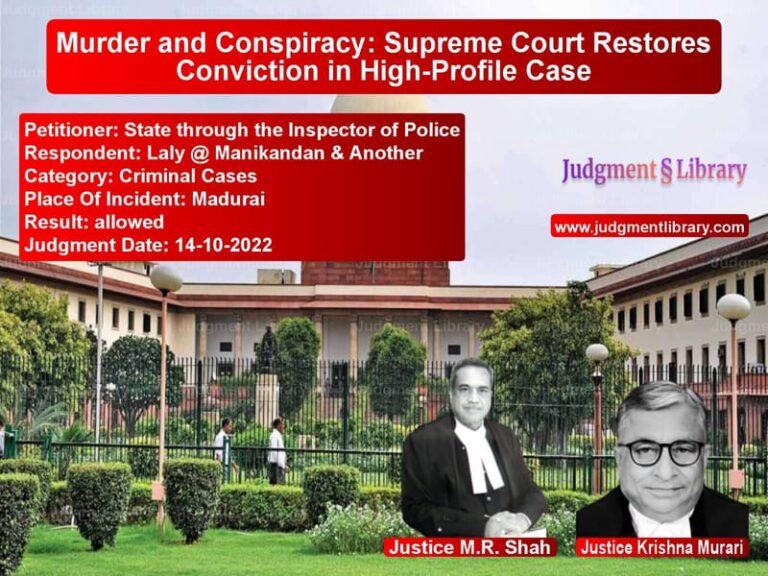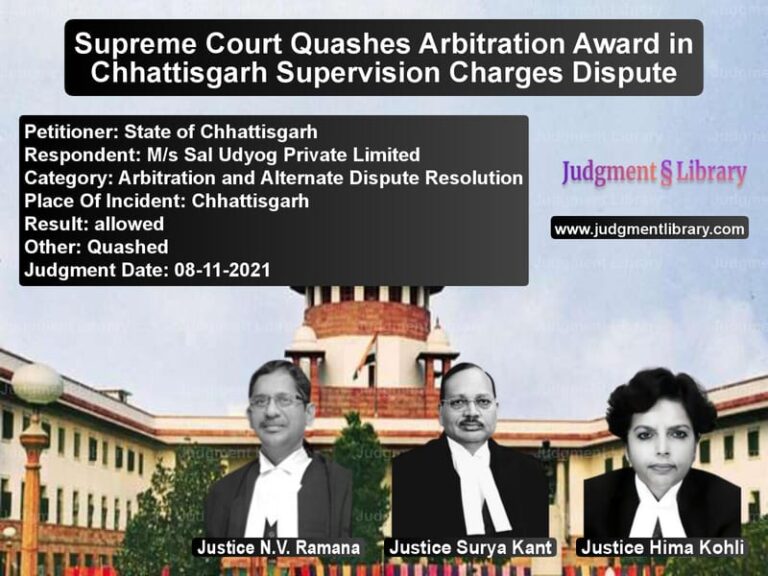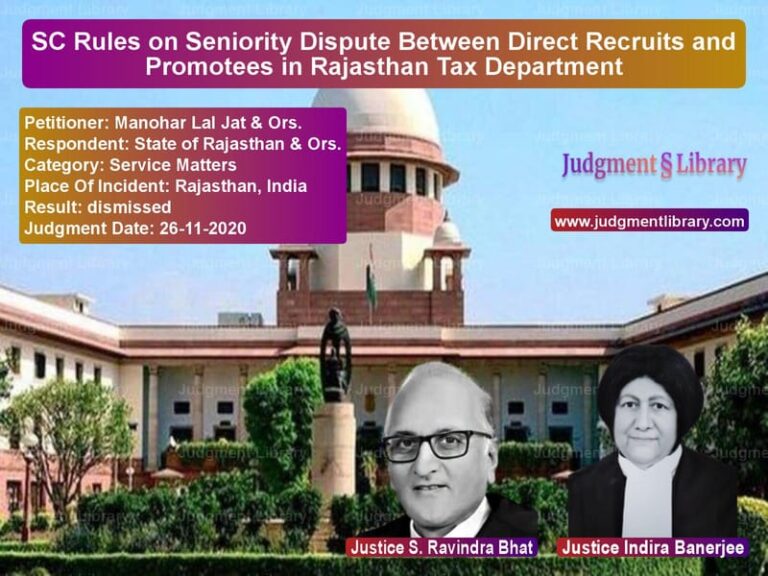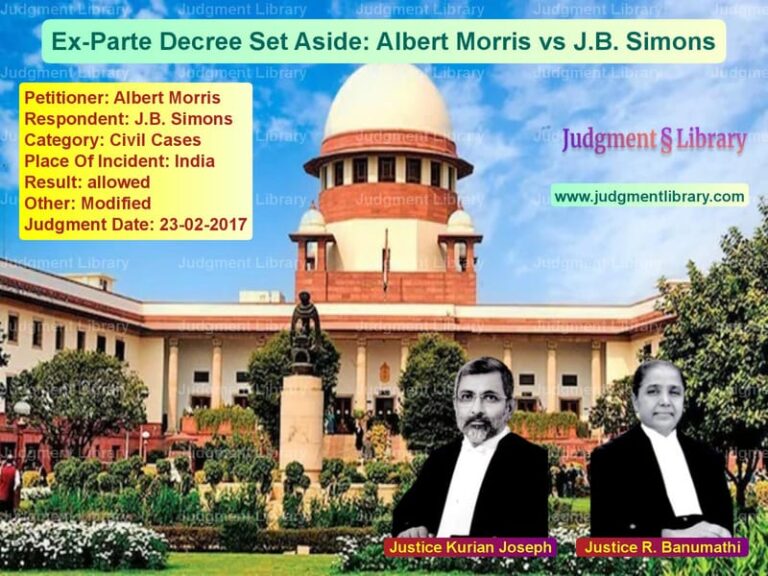Supreme Court Cancels Bail in Rajasthan Murder Case: Upholds Rule of Law
The Supreme Court of India recently overturned a bail order granted by the Rajasthan High Court in the case of Manoj Kumar Khokhar v. State of Rajasthan & Anr. The case revolved around the brutal murder of Ram Swaroop Khokhar, with the primary accused being Ram Narayan Jat. The apex court held that the High Court had erred in granting bail without proper consideration of the gravity of the offense and its implications on justice.
Background of the Case
The appellant, Manoj Kumar Khokhar, the son of the deceased, had lodged an FIR against the accused, Ram Narayan Jat, under Section 302 of the Indian Penal Code (IPC). The complaint stated that on December 8, 2019, at around 4:00 PM, the accused pinned the deceased to the ground, sat on his chest, and strangled him to death at the Lalpura Pachar bus stand.
According to the FIR, there had been a long-standing enmity between the accused and the deceased, stemming from political rivalry. The deceased had previously contested elections for the position of Sarpanch in Mandha Bhopawaspachar village, despite opposition from the accused and his family.
Key Legal Issues
- Whether the accused was wrongly granted bail despite the severity of the offense.
- Whether the High Court erred in its reasoning for granting bail.
- The implications of granting bail to an accused in a politically charged murder case.
Arguments by the Petitioner
The appellant contended that:
- The accused had a history of threatening the deceased, and there was political enmity between them.
- The deceased suffered from a 54% physical impairment and was incapable of defending himself.
- The post-mortem confirmed death by strangulation.
- The accused was a politically influential person who could tamper with evidence and threaten witnesses.
- The High Court failed to provide adequate reasoning for granting bail.
Arguments by the Respondents
The respondent-accused, represented by Advocate Aditya Kumar Choudhary, argued that:
- The FIR was lodged as an afterthought and was delayed.
- There was no history of enmity between the deceased and the accused.
- The incident was an isolated altercation and not a premeditated murder.
- Eye-witnesses confirmed that the deceased collapsed at the bus stand after the scuffle.
- The accused had no prior criminal record.
Supreme Court’s Observations
The Supreme Court, in its ruling, made several critical observations:
“The High Court has lost sight of the material aspects of the case and, by a very cryptic and casual order, de hors coherent reasoning, granted bail to the accused.”
“When a serious offense like murder is alleged, courts must consider the gravity of the crime, the impact on society, and the likelihood of the accused absconding or influencing witnesses.”
Key Legal Findings
- Severity of the Offense: The Court noted that the offense was grave, involving the premeditated murder of a physically impaired person.
- Political Influence of the Accused: The Court acknowledged that the accused had substantial influence in the village and could potentially intimidate witnesses.
- Lack of Justification in High Court’s Order: The Court found that the bail order lacked reasoning and did not consider critical factors such as the nature of the crime and witness protection.
- Risk of Tampering with Evidence: The Court stressed that the accused’s political clout could enable him to manipulate the legal proceedings if released on bail.
Final Judgment
The Supreme Court set aside the bail order and directed the accused to surrender within two weeks. The Court reaffirmed the principle that bail cannot be granted in cases involving heinous crimes without substantial justification.
Implications of the Judgment
This ruling serves as a precedent for future bail applications in serious criminal cases, emphasizing:
- Need for Proper Reasoning: Courts must provide detailed reasons when granting bail in murder cases.
- Public Interest Consideration: Bail should not be granted if it poses a threat to public order or justice.
- Protection of Witnesses: Courts must consider the potential for witness intimidation.
Conclusion
The Supreme Court’s decision in Manoj Kumar Khokhar v. State of Rajasthan & Anr. underscores the importance of judicial discretion in bail matters. The ruling ensures that justice prevails by preventing undue advantage to influential accused individuals. This landmark judgment reaffirms that the legal system must prioritize the gravity of the crime and the interests of the victims over procedural leniency.
Petitioner Name: Manoj Kumar Khokhar.Respondent Name: State of Rajasthan & Anr..Judgment By: Justice M.R. Shah, Justice B.V. Nagarathna.Place Of Incident: Jaipur, Rajasthan.Judgment Date: 11-01-2022.
Don’t miss out on the full details! Download the complete judgment in PDF format below and gain valuable insights instantly!
Download Judgment: manoj-kumar-khokhar-vs-state-of-rajasthan-&-supreme-court-of-india-judgment-dated-11-01-2022.pdf
Directly Download Judgment: Directly download this Judgment
See all petitions in Murder Cases
See all petitions in Bail and Anticipatory Bail
See all petitions in Custodial Deaths and Police Misconduct
See all petitions in Judgment by Mukeshkumar Rasikbhai Shah
See all petitions in Judgment by B.V. Nagarathna
See all petitions in allowed
See all petitions in Quashed
See all petitions in supreme court of India judgments January 2022
See all petitions in 2022 judgments
See all posts in Criminal Cases Category
See all allowed petitions in Criminal Cases Category
See all Dismissed petitions in Criminal Cases Category
See all partially allowed petitions in Criminal Cases Category






